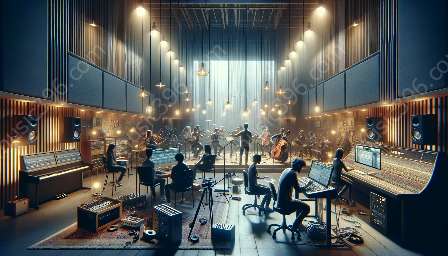Live performance composition is a dynamic and multifaceted field that combines technical skill with artistry and creativity. As composers and musicians strive to create compelling music for live performances, they encounter a myriad of ethical considerations that shape their work and influence its impact on audiences and the broader society.
Exploring the ethical dimensions of live performance composition provides valuable insights into the intersection of music, technology, societal norms, and cultural sensitivity. This comprehensive exploration delves into the complexities and nuances of ethical decision-making in music composition, offering a broader understanding of the responsibilities and challenges faced by composers and performers.
Technology's Influence on Ethical Considerations
Advancements in music technology have significantly transformed the landscape of live performance composition. The accessibility of digital tools and software has empowered composers to experiment with innovative sounds and arrangements, pushing the boundaries of musical expression. However, the use of technology in music composition raises ethical concerns related to authenticity, originality, and the implications of digital manipulation.
When creating music for live performances, composers must carefully consider the ethical implications of relying heavily on technology. This includes questions of artistic integrity, the potential for misrepresentation, and the impact on the live music experience. By critically examining the ethical dimensions of technological intervention in music composition, composers can navigate the balance between technological innovation and artistic responsibility.
Societal Norms and Cultural Sensitivity
Music composition for live performances is inherently intertwined with societal norms and cultural context. Composers must grapple with ethical considerations surrounding cultural appropriation, representation, and respect for diverse musical traditions. In an increasingly interconnected world, the global exchange of musical influences demands heightened awareness of cultural sensitivity and ethical engagement.
Respecting the cultural origins of musical elements and genres becomes paramount in live performance composition. Ethical dilemmas arise when composers navigate the fine line between drawing inspiration from diverse traditions and inadvertently perpetuating cultural stereotypes or exploiting musical heritage. By embracing ethical frameworks that prioritize cultural authenticity and respectful engagement, composers can contribute to a more inclusive and socially conscious musical landscape.
Power Dynamics and Ethical Responsibilities
Live performance composition also encompasses considerations of power dynamics and ethical responsibilities concerning collaboration, representation, and the treatment of performers. Composers wield influence over the creation and presentation of music, impacting the narratives and messages conveyed through their compositions. Acknowledging the ethical implications of power dynamics entails fostering equitable and respectful partnerships within the music industry.
Confronting ethical dilemmas related to representation and inclusion, composers play a pivotal role in shaping the narratives expressed through live performance compositions. Recognizing the impact of their creative decisions on performers and audiences, composers can leverage their influence to advocate for ethical practices, diversity, and positive social change within the music community.
Ethics, Artistry, and Audience Engagement
The ethical considerations in live performance composition intersect with the overarching goal of engaging and impacting audiences. Composers must navigate the delicate balance between artistic expression and responsible audience engagement, especially in live settings where the immediacy of musical performance heightens the ethical stakes.
Considering the ethical dimensions of audience engagement entails fostering transparency, authenticity, and meaningful connections through music. Composers grapple with questions of artistic intent, representation, and the ethical use of emotional and sensory elements to captivate audiences. Crafting live performance compositions that ethically resonate with diverse audiences requires thoughtful reflection on the potential impact and implications of musical expression.
Ethical Decision-Making in Music Composition
Examining ethical considerations in live performance composition invites composers and musicians to engage in intentional and reflective decision-making processes. Ethical awareness and conscientious choices shape the trajectory of musical creation, influencing the cultural, social, and emotional impact of live performances.
In navigating the ethical complexities of music composition, a commitment to transparency, integrity, and ethical awareness guides composers toward responsible and impactful artistic expressions. Embracing an ethical framework in live performance composition fosters a culture of respect, empathy, and integrity that resonates with audiences and contributes to the ethical evolution of music as a dynamic and influential art form.
By delving into the ethical considerations that underpin live performance composition, composers and music enthusiasts alike gain a deeper understanding of the intricate interplay between music, ethics, and societal dynamics. This exploration illuminates the multifaceted nature of ethical decision-making in music composition while emphasizing the potential for positive ethical transformation within the realm of live performance.




























